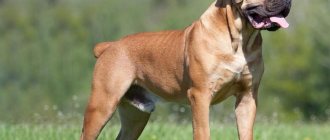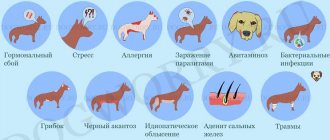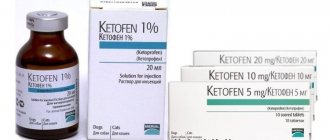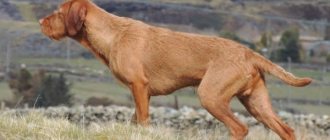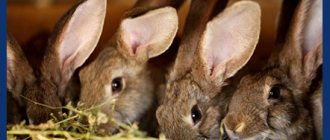Rotten meat and rot
There are quite a few reasons why a dog starts to smell unpleasant, but the main ones are:
- Stress . During stressful situations of a physical nature, dogs begin to emit an unpleasant odor. This occurs mainly during prolonged pain.
- Fear . Often, pets, experiencing a feeling of fear, begin to spontaneously emit a foul odor. The source of fear can be anything; in apartments it is mainly electrical appliances, in particular a vacuum cleaner and a blender.
Many dog owners have noticed that as soon as they start cleaning their apartment or house, the pet hides in some corner and does not come out until the cleaning is completed, but after such cleaning the unpleasant smell is felt even stronger than before. To prevent this from happening, it is advisable to use such items only when the animal is not in the house.
What dogs don't smell like dog?
The category of dog breeds that do not smell like dog , in particular, includes miniature breeds that were specially bred to live together with humans. These include:
- bichon frize,
- poodles,
- continental spaniels - Phalene and Papillon,
- Shih Tzu.
Representatives of terriers with soft coats that do not shed, have almost no odor and do not cause allergies:
- York,
- Bedlington Terrier,
- all types of schnauzers,
- Skye Terrier.
Fish
Owners often complain that their pet smells like rotten fish - why this happens and what is the reason:
- Disease . Often during diseases of the gums, teeth and gastrointestinal tract, as well as when the anal glands are blocked, the smell of fish may emanate from the animal. It is important to remember that dogs, especially large breeds, need to periodically brush their teeth, as they have food remaining between their teeth, which subsequently begins to rot and emit an unpleasant odor. If this solution to the problem does not help and the pet continues to smell fishy, then you should contact a veterinarian who can determine the cause, prescribe treatment and, if necessary, review the dog’s diet.
- Nutrition. An unpleasant odor emanating from a dog is one of the signs that the pet’s diet is not suitable for him. Often the desire to pamper your beloved pet with some bakery results in the sebaceous glands starting to work with greater activity, as a result, producing more fat, which, in turn, provokes the appearance of an unpleasant odor.
A dog is not a dump for uneaten food! You should think about its health, especially in terms of nutrition.
Incorrectly selected dry dog food can also cause the pet to stink, in this case you just need to switch to food from another company or manufacturer. Usually, just a couple of weeks after changing food from one brand to another is enough for the dog to stop stinking and start smelling nice again.Over time, a dog that is fed fish too often begins to emit a specific odor. Fish is, without a doubt, very healthy, but it is not recommended to constantly feed your pet only this product.
It is undesirable to give your animal homemade food, especially for those food products that help activate the processes of rotting and decomposition of food debris in the intestines: potatoes, pasta, cabbage, beans, peas, meat. Often they become the cause of the development of gastrointestinal tract diseases in pets .
Why your dog is itchy and smells like fish from under its tail: harbingers of illness
What to do
As we have already said, the reason why your dog stinks is most likely due to poor care for it, because our four-legged friends often like to dig in the dirt, and also sniff everything that lies on the ground, often the feces of other dogs and not only. Dogs also love to lie in the dirty grass or drink water from a puddle. Here are some tips on what to do when your dog smells bad:
Think about what you feed your dog
Many dog owners mistakenly believe that their pet’s diet should be based only on meat and its derivatives. Thus, they lead to bleeding. This is manifested by allergic skin lesions. The animal scratches itself, which often leads to secondary bacterial, fungal or yeast infections.
© shutterstock
Examine the skin
Dermatitis can also occur as a result of hypersensitivity to flowering and dusty plants, dust, mites, etc. This condition is called atopic dermatitis. Atopia (from the Greek atopos) means "unusual, strange." This only occurs in some individuals with a predisposition to react to disease-borne substances in general. This is due to genetic factors and is therefore passed on to descendants. There is also atopic dermatitis from fleas, which occurs due to hypersensitivity to flea bites. All of these diseases can be the reason why your dog stinks.
An unpleasant change in the smell of diseased skin is also associated with a staphylococcal infection or the development of mycosis. Skin diseases caused by parasites, such as demodicosis or scabies, also appear.
If the dog stinks, this may be a consequence of endocrine disorders such as hyperadrenocorticism, hypothyroidism and impaired secretion of sex hormones due to recurrent pyoderma. In principle, any change in a dog's skin should be a reason to consult a veterinarian.
Look at the teeth and ears
If a change in smell affects the head area, this is a signal to pay attention to the animal’s teeth, that is, plaque, tartar and the condition of the gums. An unpleasant odor can also be caused by inflammation of the external auditory canal, especially if it lasts for a long time.
© shutterstock
Sick dogs behave differently. Some are worried, walking from corner to corner, flapping their ears, others are looking for a quiet place, sad and apathetic, tilting their heads towards the sore ear, hot and sensitive to the touch.
If your dog smells, check your sinuses
However, an extremely unpleasant odor accompanies inflammation of the dog's paranasal sinuses. Due to a diet poor in dietary fiber and certain individual tendencies, these sinuses become inflamed and fecal-purulent matter accumulates in them, which of course stinks. Dogs then become extremely itchy in the area, licking it vigorously. Often they even itch all over the body.
Then the owners often deworm the dog, suspecting the presence of parasites. However, the only effective way to help in this case is for the veterinarian to empty the residual masses, rinse the sinuses and apply antibiotic ointment to them. Surgery is necessary for advanced lesions.
Inflammation of the foreskin is also common in male dogs, which if left untreated leads to constant licking of the foreskin. As a result, sometimes the tonsils become inflamed, which can also lead to bad breath.
In fact, every dog disease negatively affects the appearance, condition and smell of both skin and coat.
Dogmeat
Most often, the reason why dogs smell like dog is the most commonplace - poor hygiene . Hygiene procedures play a very important role in the life of a four-legged pet. Often, the smell of a dog appears due to insufficient quality care for the animal.
Usually the sources of unpleasant odor are : the mouth, fur, ears and under the tail.
If the dog’s fur is actively growing, an unpleasant odor has appeared (especially after bathing or if the dog’s fur gets wet in the rain outside), but the dog is actively itching - these are signs of fungus !
Fact: A healthy dog does not smell.
The natural smell of a dog (subject to hygiene rules) is very gentle and neat, audible only during close contact. If the smell “hits” your nose, this is a sign of illness.
With fungus, the smell has a cloying scent, very similar to the smell of socks or rubber sneakers worn for a week. If you bathe your dog with shampoo, the effect will last no more than a couple of hours, then the smell appears again. The smell nests: at the base of the tail, on the paws, in the groin.
Why does a dog smell like dog?
Why does a dog smell like dog ? Everyone knows that dogs hardly sweat, so the dog smell should not be associated with the smell of sweat. Each pet has a set of scent glands that function as intended. In the animal world, individual odors are very important; they are a tool of communication and protection. The main sources of odor are:
- Skin glands that secrete lubricant for the fur. The number and significance of the glands determines whether the breed will be classified as odorous or non-odorous. Many dogs bred to work on water or in abnormal climatic zones have more fat glands. Dogs with very short hair also have oily skin, which is why many short-haired dogs have a strong odor. Breeds without undercoat actively produce coat lubricant, which is why their wet coat smells strongly.
- Sweat glands located between the fingers - the sweat of dogs has a different aroma. Some owners complain that their dog's paws smell like stinky socks, while others smell like sweets or popcorn. The reason for such a spectrum is that the smell of sweat is the scent of a personal trace, and here everything is the same as with people, because dogs also smell differently. To eliminate paw odor, you need to wipe them after a walk. In winter and summer, the aroma from the paws is stronger.
Almost all healthy dogs do not have a strong odor if properly cared for, with the exception of dogs for which this odor is considered a breed characteristic.
Dirty socks
Sometimes dogs give off a very specific smell. Its cause will most likely be parasites . There are a number of parasites that settle on a dog’s skin and can spread the smell of dirty socks. The source of infection can be anywhere, even in the house. Therefore, if such a smell appears in a dog, first of all, it is necessary to disinfect the house or apartment, and then take the pet to the veterinarian.
Often the source of such an infection is a fungus; usually the veterinarian in this case recommends a course of vitamins to boost immunity: gamavit, hemobalance, baksin, aminovit.
Read more about this smell in the article What to do if your dog’s paws smell?
There is no definite answer to this question; you need to act comprehensively, step by step, eliminating all possible causes of the unpleasant odor.
Hygiene
The first thing you should pay attention to in preventing unpleasant odors is hygiene. The coat, especially in long-haired breeds, needs regular cleaning and combing, and therefore the dog needs to be bathed periodically, but do this no more than once a week or 10 days .
After bathing, the pet must be thoroughly dried, preferably using a hairdryer. However, it is important to remember that the temperature during drying should be as low as possible, otherwise the sebaceous glands will begin to secrete even more sebum, making washing the dog a waste of time.
When brushing your pet, you need to carefully comb out all matted hair, as this can also be a source of bad odor from the dog.
When Head&Shoulders is not a help: dog dandruff
When choosing a shampoo for a dog, you should take into account what type of coat and skin your pet has. It is best to give preference to natural products, that is, those that do not contain fragrances or any additives.
If a dog is afraid of water, then the smell after bathing may intensify, especially if you bathe it without any special shampoo, but simply with laundry soap.
Often the cause of an unpleasant odor is dirty ears , which is why owners should regularly clean their pet's ears. In addition, regular hygiene of your dog’s ears will help prevent the development of diseases that lead to inflammation of the ears.
A large amount of dirt and debris also accumulates on your pet's paws, which can cause odor. Therefore, after each walk, you should wipe your dog’s paws with a damp towel and carefully examine them for injuries to prevent infection and bacteria. If necessary, you need to treat your paws with a disinfectant.
Another important aspect of a dog’s hygiene is its teeth ; they need to be brushed every other day with specially designed toothpastes or, in extreme cases, children’s toothpaste.
How to wash it so it doesn't stink?
First aid is Nizoral medicinal shampoo (can be bought at a regular pharmacy), diluted in a 1 to 1 ratio with water. You need to thoroughly soap your dog and leave it on for 5-10 minutes before rinsing it off. In difficult cases, you need to wash the dog 5-6 times every other day.
If you already have bald spots on your fur, then run to the vet! He will scrape the fungus and prescribe an ointment (for example, triderm or malavit).
Do not buy fungal vaccines yourself! Only a doctor can calculate their dose, and the vaccine itself is not a magic wand at all, because there are more than 70 types of fungi!
How to wash an animal so that it doesn’t smell like a dog if store-bought shampoos don’t help? There are 2 tips that are only suitable if absolutely all health and skin problems are excluded , otherwise such cleaning will only make everything worse.
- You need to mix water, vodka and vinegar in equal parts. Then, using newspaper, remove dirt from the dog’s fur. It is extremely important to dry the animal afterwards , otherwise there is a high risk of catching a cold.
- Moisten the animal's fur with a solution of baking soda from a spray bottle (1 tablespoon per glass of water), and when the fur dries, comb it thoroughly. Baking soda gets rid of unpleasant odors and makes the coat shiny and pliable to comb.
Do not try to mask the smell with perfumes, deodorants or scented products! You will only strengthen it and make it completely unbearable . Just imagine: the smell of dog with a slight touch of Chanel No. 5!
Hygiene procedures and nutrition
The fault for the appearance of unpleasant behavior from a dog as a result of failure to comply with hygiene procedures and improper nutrition lies with the owner.
The following factors lead to problems:
- no ear cleaning once every two weeks;
- poor oral hygiene;
- lack of water procedures;
- the use of shampoos and gels for humans when bathing, which dry out the dog’s skin and coat;
- a large amount of protein in food or switching the dog to a fish mono-diet gives the urine a strong ammonia smell.
Visit to the veterinarian
In order to exclude the occurrence of any serious health problems in your dog, it is recommended to regularly visit the veterinarian, carry out vaccinations on time and promptly treat all diseases.
In conclusion, it is worth noting that caring for a dog is not an easy task, but with the right approach, the pet will definitely thank its owners with excellent health, a cheerful disposition and, most importantly, a pleasant aroma.
If anyone would like to share their experience or have any questions, you can discuss it below. Comments with photos are welcome.
Bathing a dog
An easy way to get rid of dog stink is to regularly bathe your dog. Your veterinarian will tell you how to wash your dog so that it doesn’t smell like dog. He will select a product that will completely rid the dog of an unpleasant odor, and not just mask the stench.
You need to remember that you can completely bathe your pet 1-2 times a month, and every day after walking you wash its paws and belly with warm water, and comb its fur to prevent the formation of tangles.
The dog can be washed without water, using a special powder containing talc and adsorbing granules. The powder must be thoroughly rubbed into the coat, distributed over the surface and gently combed out.

